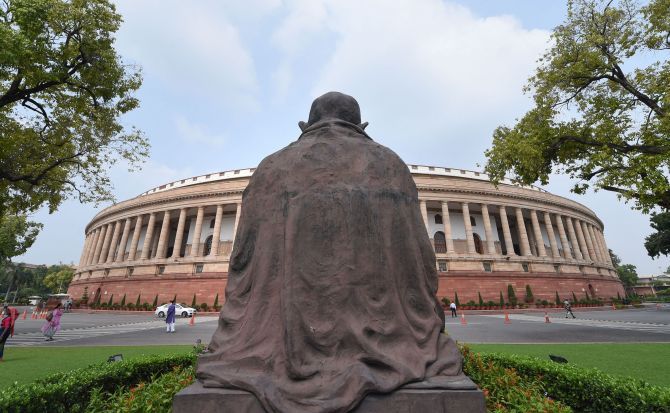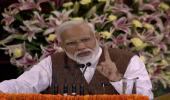Union ministers said Parliament passing over two dozen bills was evidence of increased productivity of the Narendra Modi government 2.0.
Archis Mohan reports.

On Friday, the Lok Sabha and Rajya Sabha passed three bills each. In its 35 sittings this session, the two Houses of Parliament have passed a staggering 26 bills.
In terms of legislative business transacted during the first session of a fresh Lok Sabha, the government claims the current session is on course to be one of the most productive since the first Lok Sabha in 1952.
Union ministers have said Parliament passing over two dozen bills was evidence of increased productivity of Narendra Modi government 2.0.
The Opposition has variously accused the government of steamrolling Parliament, muzzling voices of dissent, refusing to build consensus on important issues and enacting laws in a hurry by refusing to refer a single of the 37 bills introduced in the two Houses (32 in the Lok Sabha and 5 in the Rajya Sabha) for further scrutiny by sending bills to standing or select committees in the ongoing session.
Until now, the government has turned down Opposition’s demand to send even a single bill to parliamentary committees, particularly contentious ones.
In its defence, the government has argued that some of the bills, sent to committees during the tenure of the previous Lok Sabha, lapsed with the dissolution of the 16th Lok Sabha because the Opposition had blocked these then.
However, there were signs of a truce on Friday.
According to sources in opposition parties, the government indicated it could agree to send some of the pending bills for further scrutiny to parliamentary committees in the remaining three days of the session.
It is likely that Bills related to regulation of surrogacy, protection of transgender persons, occupational safety and inter-state river water disputes are sent to standing/select committees.
Opposition leaders argued that they had wanted some of the more contentious bills referred to committees, particularly 'triple talaq', Unlawful Activities (Prevention), National Investigation Agency (Amendment), Right to Information and National Medical Commission Bills.
Opposition leaders also complained that the government had refused to accede to their demands of 'short duration discussions' on burning issues, including one on the 'freedom of the media' in the Rajya Sabha and are unhappy with the manner in which presiding officers have conducted proceedings in the two Houses.
On Thursday, Congress's Anand Sharma and Rajya Sabha Deputy Chairman Harivansh had a heated exchange during the debate on the National Medical Commission Bill.
Harivansh ignored a couple of Opposition MPs, who asked Health Minister Harsh Vardhan to clarify a point. As Opposition members protested, Harivansh said nothing will go on parliamentary record.
"Are we kindergarten students? You cannot treat us like this every day. We cannot even seek a clarification. Parliament is to deliberate. Why do we come here? This is a democracy," Sharma said while another Opposition member pointed out that the minister was on his legs and willing to clarify.
Opposition leaders, including Congress’s Ghulam Nabi Azad, Trinamool's Derek O'Brien and others, have on the floor of the Rajya Sabha complained of increasing trust deficit with the government.
Working at break-neck speed
- Session sittings 35 days (until Friday)
- Three more sittings until August 7 (unless extended again)
- Bills passed by both Houses - 26 (including Finance and Appropriation Bills; Two Bills passed by both Houses; but LS needs to again approve RS amendments to Motor Vehicles and National Medical Commission Bills)
- No. of Bills passed by LS - 28
- No. of Bills passed by RS - 26
- No. of Bills introduced in RS - 5
- No. of Bills introduced in LS - 32
- No. of Bills referred to standing/select/joint committees this session: 0
- Bills introduced this Session but pending (in both or either House) – 10
- Likely to be introduced – at least 2 (SC judges and J&K reservation second amendment Bills)












 © 2025
© 2025